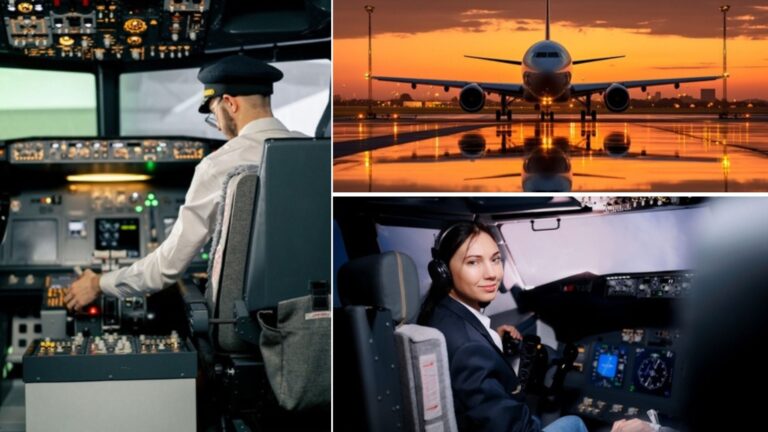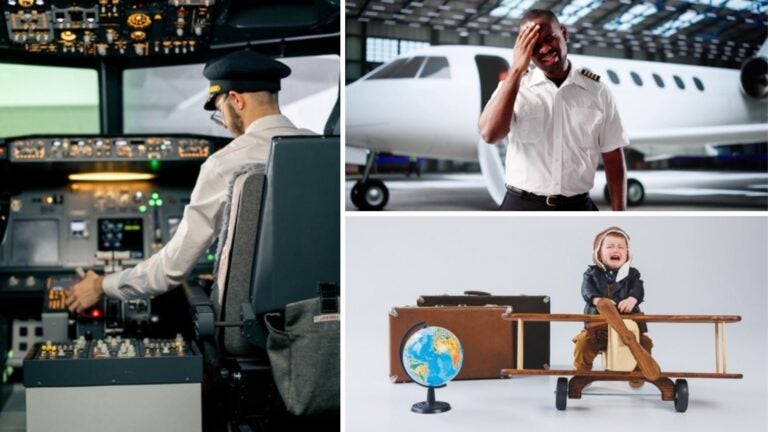What are the pros and cons of being a pilot?
Before dreaming of seeing the world from an airplane, it's a good idea to learn about the pros and cons of being a pilot.
Being an airline pilot means adapting to an unconventional lifestyle. This demanding profession, which requires a great deal of responsibility, can also be highly rewarding in many aspects of life. If you’re considering this career, it’s important to weigh the pros and cons of being a pilot before deciding if it’s the right path for you.
Being a pilot is one of those careers that fascinates people and earns admiration in equal measure. Sleek uniforms, exciting travel, and prestige are often what come to mind. But the reality isn’t always as glamorous as it seems. The job demands real dedication and often requires sacrificing things many of us take for granted, like weekends with family. Still, the rewards can be significant.
Stay with us, because next we’ll take a look at the upsides and downsides of life as a pilot. Our goal is to help you make a well-informed decision if you’re thinking about pursuing this career.
What are the advantages of being an airline pilot?
Being a pilot is about much more than just flying a plane. It’s a career that blends technical skill, discipline, passion, and a healthy dose of adrenaline. Those who choose this path find it challenging, but also incredibly rewarding.
Next, we’ll go over the main advantages of being a pilot and explore why this career continues to captivate young people around the world.
1. Competitive salary and global opportunities
Salary is a major motivation for many aspiring pilots. Commercial pilots, especially those flying for international airlines, earn pay well above the average.
According to various industry sources, an airline pilot can earn between $6,000 and $12,000 per month, depending on the airline, experience, and type of aircraft. Long-haul captains tend to be at the higher end of the scale, while first officers or co-pilots start with more modest salaries that grow as they log more flight hours.
Airlines like Emirates, Qatar Airways, Singapore Airlines, Lufthansa, and Cathay Pacific are known for offering some of the best working conditions and benefits. Many of them provide pilots with housing, health insurance, flight tickets for their families, and annual performance bonuses.
This mix of job stability, benefits, and global opportunities makes aviation one of the most appealing careers in the fields of transportation and engineering.
2. Opportunity to travel and see the world
Who hasn’t dreamed of traveling the world? Few careers let you watch the sunrise from above or land in three different countries in a single week. Being a pilot is, in many ways, having the world as your office.
Even though the job is demanding and rest periods can be limited, the chance to travel to different destinations remains one of the biggest perks of being a pilot. Long layovers offer the opportunity to explore new cities, try different cuisines, or simply relax by the sea in some remote corner of the world.
Pilots also develop a global, multicultural perspective, working alongside international crews, adapting to different languages and customs, and learning to navigate any environment with ease.

3. Professional prestige and sense of community
Few professions earn as much respect as piloting. People admire the ability to safely guide hundreds of passengers through the skies. But beyond that recognition, pilots often talk about the pride of being part of a community that values skill, excellence, and strong teamwork.
Teamwork is at the heart of aviation. From co-pilots and flight attendants to technicians and air traffic controllers, everyone relies on each other. Every successful flight is a shared achievement celebrated across the industry.
The aviation community is also close-knit and supportive. Pilots often share experiences, tips, and best practices through specialized forums or professional associations, and there’s a deep respect among colleagues, especially for those with more experience. This sense of camaraderie, rare in many other professions, is one of aviation’s greatest strengths.
4. A challenging and constantly evolving profession
Being a pilot comes with daily challenges that go far beyond just flying. Each day is different. Weather changes, flight routes are updated, airports have their own quirks, and decisions often have to be made in seconds.
Some of the most common challenges pilots face include landing in bad weather, handling technical emergencies, coordinating with busy air traffic control, and managing night flights or pressure changes that demand full concentration.
That’s why pilots need to develop a set of essential skills, including making quick decisions under pressure, effective communication, leadership, emotional control, and analytical thinking. On top of that, strong teamwork is crucial, since safety depends on how well the entire crew works together.
For those who enjoy challenges and mastering technical skills, this career offers constant opportunities to grow. Every flight is different, pushing pilots to give their best and stay sharp at all times.
5. Continuous training and ongoing professional development
Becoming a pilot is a long, demanding, and costly process, but it is also one of the most stimulating from an educational standpoint.
Most pilots start with a Private Pilot License (PPL), which lets them fly for fun or training. Next comes the Commercial Pilot License (CPL), which allows them to get paid for flying. To command large aircraft or work for an airline, pilots need the Airline Transport Pilot License (ATPL), the top certification in civil aviation.
The total training time varies by country, but it typically takes between two and four years. This includes over 200 hours of actual and simulator flight time, along with written exams and thorough medical evaluations.
Training doesn’t stop once a pilot earns their license. Pilots must renew their certifications regularly, undergo medical check-ups, and take part in simulator sessions that replicate real emergencies. This ongoing training ensures they stay up to date with new technologies, safety procedures, and changes in international regulations.
In short, it is a career that combines technical skills, lifelong learning, and a passion for flying.

What are the disadvantages of being an airplane pilot?
Being a pilot is rewarding, but it’s not always glamorous. The career demands long hours, personal sacrifices, and constant pressure to stay at the top of your game.
Now we will go over some of the biggest challenges of being a pilot, the things you should understand before deciding if this career is right for you.
1. Irregular schedules and time zone changes
One of the biggest challenges of being a pilot is the lack of a fixed schedule. Shifts change week to week and can include early mornings, holidays, and weekends. One day a flight might depart at six in the morning, and the next at eleven at night. This irregularity can disrupt sleep patterns and lead to cumulative fatigue, a major challenge in aviation.
On top of that, there are the challenges of changing time zones. On long-haul flights, pilots constantly have to adjust to new time zones, which can take a toll on both the body and mind.
Even though airlines have mandatory rest periods and recovery protocols, finding a balance between work and proper rest is not always easy.
2. Long absences from home and complicated family life, one of the main disadvantages of being a pilot
Long stretches away from home are an unavoidable part of a pilot’s life. Those flying international routes can spend days or even weeks away from their families, staying in hotels and stopping in different cities along the way. This can take a real toll on personal life, especially for pilots with young children or partners who keep more regular schedules.
That’s why pilots become skilled at making the most of their time off. They learn to cherish their breaks and nurture relationships through patience and clear communication.
Even so, it’s not uncommon for the isolation and irregular family routines to lead some pilots to retire early or move into training or management roles within aviation.

3. High levels of stress and constant responsibility
Few careers carry as much responsibility as being a pilot. Every flight involves the safety of hundreds of people, and every decision must be made with complete accuracy.
There is virtually no margin for error, which is why pilots must be ready to handle technical emergencies, bad weather, sudden turbulence, or medical issues on board.
Added to all this is the psychological pressure of maintaining calm in front of passengers and crew, even in risky situations.
The responsibility is constant. Pilots need to stay focused from the pre-flight checks right through to touchdown. Modern technology can help, but nothing replaces human judgment and attention.
4. High costs of training and license maintenance
Becoming a pilot requires a significant financial investment. Earning a Commercial Pilot License and completing the required flight hours can easily cost $70,000 to $80,000, depending on the country and flight school. Adding ratings for multi-engine aircraft or commercial jets can push the cost even higher.
Expenses continue even after getting the license. Pilots must keep their certifications up to date, complete regular medical checks, train in simulators, and take continuing education courses. It’s a career that requires a steady investment over time.
That’s why it’s important to plan your finances before getting started or explore scholarships, loans, and sponsorship programs offered by airlines or flight schools. Some companies cover part of the training in exchange for a future work commitment, though these opportunities can be competitive.
5. Impact on physical and mental health
Another drawback of being a pilot is the constant physical and mental demand of the job. Long hours in the cockpit, continuous exposure to pressure changes and high-altitude radiation, irregular meals, and disrupted sleep can all take a toll on health over time.
Aviation medical studies highlight risks such as circulation problems, chronic fatigue, digestive issues, and insomnia. On top of that, the constant stress and pressure to perform perfectly can lead to anxiety or emotional burnout.
Pilots have to go through regular medical checks, and failing to meet the required physical or mental standards can result in suspension or even losing their license. While these measures are crucial for safety, they also mean pilots are under constant pressure to perform at their best.
6. Demanding career that requires patience and strong commitment
Career progression in aviation tends to be slow and depends on flight hours, the type of licenses held, and each airline’s internal policies. Because of this, reaching the rank of captain can take over ten years.
On top of that, pilots face constant pressure to stay in peak physical and mental condition, since any decline can end a career prematurely.
Many pilots plan ahead for retirement or shift into training, management, or safety roles, where they can keep using their experience without the daily physical demands of flying.
7. Exposure to regulatory changes and external factors
The aviation industry is affected by factors beyond a pilot’s control, such as economic crises, geopolitical conflicts, pandemics, or changes in fuel prices.
Such events can lead to route cuts, layoffs, or temporary grounding, as happened during the 2020 pandemic when thousands of pilots worldwide were unable to fly for months.
Rules and regulations in aviation are always changing. Authorities like the FAA in the U.S. or EASA in Europe regularly revise safety, technical, and medical standards, and staying current requires ongoing effort, time, and investment.
In summary, a pilot’s stability depends both on their performance and on the overall situation of air transport.
Being a pilot is a career that calls for technical skill, dedication, and the ability to adapt. It requires hard work, continuous learning, and discipline, but it also brings unique rewards such as the chance to see the world, grow professionally, and be part of a respected community of aviation professionals.
Knowing the upsides and challenges of being a pilot helps you see the career realistically. It is about more than just flying. It is about handling great responsibility, staying composed under pressure, and adapting to a demanding way of life. For those who embrace it with dedication and passion, it becomes much more than a job and turns into a lifestyle.

How can you stay connected as an airline pilot?
Now that you know the ups and downs of being a pilot, let’s talk about another important part of life in the air: staying connected to the internet.
People in this line of work need to stay connected constantly, especially during long periods away from home. With international flights, airport layovers, and stops in different countries, a reliable internet connection makes it easier not only to keep in touch with family but also to handle work, access digital documents, check weather updates, and review operational reports.
Holafly’s monthly plans are a great option for staying connected. Designed for frequent travelers, flight crews, and digital nomads, they give access to global internet without depending on public WiFi or paying roaming charges. With an unlimited data eSIM, pilots can stay online in more than 170 destinations without having to switch SIM cards each time they arrive in a new country.
Holafly Plans offers monthly data packages tailored to the needs of professional travelers. You can choose between unlimited data or 25 GB, depending on how much time you spend on the move. Once activated, the service works automatically in all included countries, making it an ideal solution for pilots, flight attendants, and crew members who are always traveling.
With Holafly, global connectivity is guaranteed, from the cabin to any corner of the planet.
Important: If you are a frequent traveler and want to stay connected without worrying about expensive roaming or looking for a new SIM at every destination, Holafly’s subscription plans are for you. With a single eSIM, enjoy internet in more than 170 countries for a fixed price and no surprises on your bill. Travel without limits and connect easily and securely! 🚀🌍






 Language
Language 


















 No results found
No results found



